| |
"I prepped Mickey by giving him a copy of Albert Camus's The Outsider.
He had a reputation for volatility, but he's actually very sweet, so odd
and interesting, ideal as the mysterious Motorcycle Boy." |
| |
Director Francis Ford Coppola outlining another
reason why I responded so well to his movie. |
| |
"He could break your heart with a look. The movie traveled to the
moon every time he came onto the screen. Nobody could hold a candle to him. He was just there, didn't have to say hello or goodbye." |
| |
Bob Dylan (of all people) on Mickey Rourke
(in another movie but still, the quote stands) |
I knew it when I saw it. And that knowing is instinctive, like recoiling from a flame or flinching from a cut. There are very few certainties in the arts but when I set my eyes on this extraordinary actor, I knew I was in for something special. It's often said that Brando had 'it' – whatever 'it' was – and I was too young to fully appreciate the lithe and powerful theatrical Brando at his height – in situ so to speak – in the fifties (but have subsequently seen the film work). I've had to settle for the aging Don Corleone and the bald nut job in the jungle as my generation's defining Brando performances. I can appreciate what was so astonishing about Brando but I can't feel it the way I did with Mickey Rourke. Daring are those who will commit to a definition of 'star quality'. That rather bland sobriquet is the closest we'll get to it I suspect but even that is insipid. Charisma is only a small percentage of the whole. It is simply and eerily true that the camera just adores certain faces. Being attractive is again too shallow to encompass the effect that certain actors have. Read that Dylan quote again – I know exactly what he means. Rourke happened and in the very first scene I saw him (Body Heat) he blew William Hurt off the screen. Nobody blows William Hurt (insert off colour gag here). I was mesmerised. That's close. It's like being gently hypnotised, the feeling I got watching Tony Hart conjure up some artistic magic in a fondly remembered children's TV programme. You'll find me in that same blissed out state if you put a working blacksmith and forge in front of me. Certain things fascinate and hold me in their thrall. I'm so glad I can't explain why. Rourke, in his early career, was one of those things.
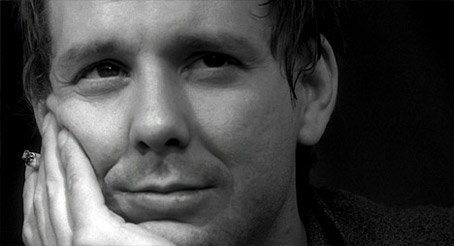
So after his performance in Barry Levinson's wonderfully evocative, funny and touching Diner (in one memorable scene, literally touching), Coppola comes along, recognises this extraordinary quality from a previous movie audition and gives him the role that came closest to defining the 'Mickey Rourkeness' that simply exists on screen. Coppola understood this precious property well enough to let scenes play on just Rourke, no dialogue or action, just that unusual, quietly anxious face and that feeling of existential angst, lost in time by being both acutely aware of its passage and floating above it. His purr of a voice adds to the enigma and the Camus-like burned down cigarette jammed between fingers and grey attire completes the look. As 'the Motorcycle Boy' in Rumble Fish, he's a battle scarred, eloquently smart, ex-gang leader whose violence has left him deaf and not exactly enamoured him to the town's one sadistic police officer. He's also colour blind hence Coppola's choice of black and white or rather fifty thousand shades of grey brilliantly summoned to celluloid by cinematographer Steven H. Burum. If I may quote Mr. Burum from the Production Notes:
"Because movies are a great popular medium, they've been hand-cuffed to the bondage of realism. More abstract presentations of emotion are needed, and Rumble Fish is a first attempt to try to break through realism and use images in a more abstract, feeling sort of way."
Right. I respect and admire the ambition and the creativity unleashed by such a philosophy. The only problem I have is with the words 'a first attempt'. He must be describing his or Coppola's first attempt at expressionism. I can only surmise this given that the crew glutted out on German cinema of the 30s while in production and hell, does that show. The movie looks simply stunning. Even the golf ball grain is exquisite over the Universal logo, the old one with the 'S' askew. I adore the opening of this movie; the simple title card, the time-lapse clouds, the astonishingly sharp percussive stabs, the ticking of the city clock, the 'Motorcycle Boy Reigns' sign and then Larry Fishburne enters Benny's Billiard Joint (yes, that thin stick of an actor is Morpheus from The Matrix – you should see him in Apocalypse Now). Just when you think the music cue has positioned itself to take off, wham, it's gone leaving an insanity of metronomic clicking, pulsing just below the dialogue. True story; that last sentence was written before I saw the Extra on Copeland's score and was amazed to realise that he had written a big busy opening cue and it was the mixer who rightly suggested pulling it back to certain elements and then paring it down almost completely. I sometimes get the impression I accidentally know what I'm talking about. It's disconcerting. The boldness of the craft was like a gift to me when I first saw this movie at the age of twenty-two. I mean Coppola had already made several movies knocking on critics' 'Best Of' lists that no one could be surprised about. The Godfather, its sequel, Apocalypse Now (and I'm not even mentioning The Conversation). How could 'that' guy suddenly turn around and make something like this? It feels like it's been crafted, sanded, honed and varnished. It's so daringly different in both visual and structural ways, something that may explain why it was not embraced by critics and public alike. Coppola feels his failures like wounds. The unjustifiable critical howls of outrage over One From The Heart (another one of his I loved) hurt him to the quick but instead of staying safe, he pushed what movies could be. If there is a genre that Rumble Fish fits snuggly into, it's an officially un-named one where you can find the sublime Two Lane Blacktop, the cinema of Existential Dilemma.
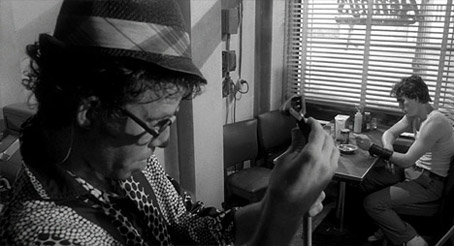
Rumble Fish is based on the novel by S.E. Hinton. She wrote it in her teens reacting to the fact there was no fiction out there that represented a slice of youth she knew and lived with daily. It's an hour's read (121 pages, small pages, large type) and the film's pretty faithful. The story centres on a local tough guy, Rusty James (Matt Dillon). A rival has challenged him to a fight. He has his own inner circle, the impossibly young Nicholas Cage (who'd recently changed his name from Coppola), the excitable and loyal Chris Penn (Sean's brother and destined-to-be Reservoir Dog) and rounding out his support group is Vincent Spano, who had made almost as big an impression on me as his co-star Rosanna Arquette in Baby It's You. Benny, the owner of the Billiard Joint is played by another favourite of mine, Tom Waits. It still makes me smile watching him trying to contain the boys' swearing; "Break it down, cool it off..." He's in his own world and the movie doesn't try and prise him out of it. Matt Dillon is not an actor I warmed to in the past. With that low-end Stallone drawl and that lupine physicality, he reminds me too much of the role he is playing. But here, of course, it's a perfect fit. He's also playing somewhat dumb. If not dumb, then uneducated because the crux of the entire movie is his frustrated relationship with his older brother, 'the Motorcycle Boy.'
At the start the unseen brother is out of town drifting somewhere but we know he's cool and we know that Rusty adores him, looks up to him, wants to be him and protect him. After an evening with his girlfriend (Diane Lane, just easing into adulthood and my dreams) and her sister (soon to be a director herself, Francis's daughter Sofia), Rusty arrives for the signature sequence of the movie, the big fight. And its technical brilliance always catches me off guard. It's choreographed beautifully and edited to the marrow. The percussion pushes the pulse up and when you think everything's over, four amazing things happen almost at once (amazing to me). Rourke arrives, cool pouring out of his eyes like a tragedy. We hear that voice for the first time, a gentle soothing voice so, so far from the gravel he used as Marv in Sin City. The fight gets a bloodthirsty full stop and finally in retaliation, a thrust of machine to man violence that I still remember so vividly from all those years ago. In the book, the Motorcycle Boy breaks his brother's assailant's wrist. The movie version of the scene is undeniably more exciting.
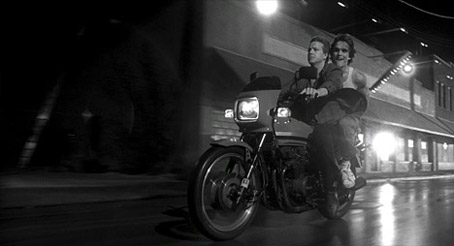
And then something happens to the film, something odd, something daring. And it's so subtle, I may have misread this completely. To find an analogy I have to go back to the same era when I saw Laurie Anderson perform United States I to IV at the Dominion in London. All we knew of her was that haunting single 'O Superman' which was by most criteria, very strange. In order to prove her musical and performing credentials, she pops on stage with a neon bowed violin and plays with such gusto and skill it was almost like she was saying "It's OK, I know what I'm doing... Sit back and relax with the other weird stuff because I'm a real musician." Coppola's direction and Barry Malkin's edit of the scene is the last we see of the action man heroics of the cast or the movie. It's Coppola reassuring us that wherever we go next, it's OK, he's a really good film-maker. We should trust him. The film switches now into Blacktop territory, fraught with thought and giddy with visual wonder. I predict that if there were two more tent-pole action sequences anything like what we are treated to in the first fifteen minutes of Rumble Fish, the movie would have been commercially successful. But that is not the movie Coppola was making. Now it's time for the brothers' relationship to take over and 'time' is the operative word as frames are filled and dotted with clocks of all kinds and there's the metronomic soundtrack to remind us. There is more violence but by the time the mugging happens the film has mutated into The Brothers James... Another Coppola regular ('difficult' but rewarding) is Blue Velvet's Frank himself, Dennis Hopper. The scenes between Hopper and Rourke are so real, I'd almost swear they are related. The bond that unites them forces Dillon to the emotional periphery. They are both educated men (Hopper's character is a hopeless drunk and it's a small irony that in the same year of the movie's release, Hopper enrolled in a drug rehabilitation program). But that intelligence becomes something father and son can acknowledge inside each other beyond the fug of father's whiskey breath and the older son's risky mythology born from a life of childhood violence. The men invite Rusty in, in one case physically pulling him down on top of them but his lack of education will always keep him at a distance.
I won't say any more about the plot but there are so many small details to enjoy on the way to the denouement, which, according to Coppola's commentary, is a wonderful example of art feeding off art. There is an incident at the end of the movie in a pet shop and Coppola asks author Sue Hinton where she got the idea. She said that she saw it in a movie... She did, and it was a Coppola directed movie, Rain People. How freaky is that? Have I anything negative to say about the movie? Not really. There is a scene (the build up to the fight about 12 minutes in) where Rusty is walking, shot from a low angle. He is picking his knees up far too far for that kind of walk and it makes me think he's doing that because of the camera tracks he's obviously walking over. The process shots, or opticals of the coloured fish and black and white footage of the boys laid behind them dramatically decrease the quality of the image. Degradation is due to the analogue system of printing generations. So in a way I liked it because it reminded me of the Age of Film.
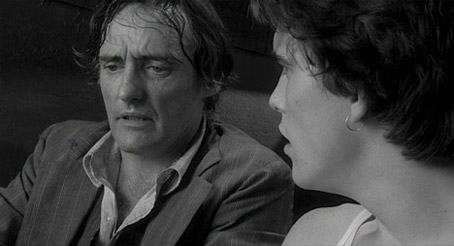
Rumble Fish is a taste, possibly an acquired one but it spoke deeply to me about life when I first saw it. You could say that as art it's leaning dangerously close to pretentious (even Coppola himself concedes that) but at the time it said something private to me and that makes it special. It said that life is not so easily deconstructed and mystery abounds and the search for enlightenment is a long one... The book Rourke is reading while his brother recovers from his wound is the famous 'As A Man Thinketh' (James Allen's literary Essay published in 1902) and sharp-eyed viewers will even discern a readable page on screen...
"To live continually in thoughts of ill will, cynicism, suspicion, and envy, is to be confined in a self made prison-hole. But to think well of all, to be cheerful with all, to patiently learn to find the good in all-such unselfish thoughts are the very portals of heaven; and to dwell day by day in thoughts of peace toward every creature will bring abounding peace to their possessor."
Not sure about the heaven part but it's as good an indication of the Motorcycle Boy's dilemma as anything else. Rumble Fish now on Blu-ray, is like the return of an old friend who's managed to stay the same age. Glorious.
Presented in the 1.85:1 aspect ratio, Rumble Fish looks sumptuously edible. Black and white may have got me drooling but in this format? The grain, so much a negative issue (pun intended) in reviews, is elevated to co-star status. I've not seen a modern black and white movie scrub up this well. Steven Burum's lighting and lens selections have worked real magic. With all respect to the Blu-ray authors, the movie couldn't have looked this wonderful if the image hadn't been there at the start. Some close ups actually forced a few intakes of breath – the detail, the resolution. In order to let the experience be 'a movie' I had to force myself to be not so stunned by the exceptional quality of the visuals.
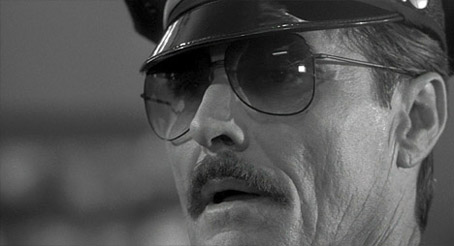
There are four distinct sound options. The original stereo – which after all these years still sounds sharp and effective; this has been transcoded to a second 5.1 choice and atmospheric substance is the real winner out of the two. The dynamic range seems to be far wider than most other movies due to the nature of the score. The sub has a few things to do but not much and the surround is more about atmosphere and immersion than gaudy effect. Thirdly, you can chose the M&E track only (music and effects) and then finally, there's Coppola's commentary.
There are optional English subtitles for the deaf and hearing-impaired.
Audio Commentary by Francis Ford Coppola
Francis Ford Coppola is always engagingly erudite. In the seventies so much was expected from the director of The Godfather that he almost keeled over from the weight of it. The making of Apocalypse Now has passed into legend and so he gently landed on the S.E. Hinton runway and got back to personal film-making. The Outsiders and Rumble Fish were shot back to back but the cinematic weight and legacy has lasted best on the shoulders of the latter and it was refreshing to hear just how personal this movie was to Coppola. He had an older brother of whom he was in awe (the movie is dedicated to August Coppola, Augie) and it's clear that film director and original novelist have connected so well. The best quote I ever heard a novelist say about a cinematic rendition of their work was Chuck Palahniuk on Fincher's Fight Club. He said that after seeing the movie he was embarrassed by the novel! Well, the author is in the movie and by all accounts pleased with the result. Coppola recorded the commentary in 2005 for the DVD special edition release (he refers to the DVD a few times and would have been much more effusive if he could see the images I was watching). In fact all the extras have been ported over from this release with the exception of the "Don't Box Me In" music video and the varied choice of soundtracks.
The gems of the commentary, for my money are the following;
-
Now famous actors Coppola launched on the world stage suddenly became 'out of range' even though Coppola had started their careers.
-
When Rusty is hit by a crowbar, Coppola had the video takes of the scene projected on a wall via very expensive video projector while shooting. This prompted the public to pronounce each take unrealistic. Coppola overshot until he realized that there were no sound effects of the blow – sound makes pictures...
-
Coppola talks eloquently about wanting to take cinema further beyond the narrow confines of realism, daring to veer off the chosen path. He then remembers that Rumble Fish did no business at all and exhorts us all not to listen to him. It's a lovely and very honest moment on the commentary.
-
The outpouring of love for the Zeiss 21mm and 18mm lenses...
-
Sound – 50% of the emotional effect of a movie and therefore it's a bargain compared to the price of getting the visuals in the can.
-
Brando's quote... "You can't care or they'll see it in your face."
Coppola would have to try really hard not to be extremely interesting. He's a filmmaker I admire because he doesn't seem to compromise and is always pushing for the new, looking for the different experience to present to an audience. He's had his moments in the mire, become at times a casualty of his own ambition but his work has been almost consistently worth seeking out. Too many people dismiss him after The Godfather (that's a tough act to follow). His good friend, George Lucas, became what Coppola wanted to be a little too early on the technological timeline. Zoetrope Studios began just that decade earlier than the tech would support. Wouldn't it have been a greater gift to cinema if Coppola had wielded the power and influence that Lucas lucked into via Star Wars? I'm not going to Lucas-bash given every opportunity (just a few perhaps) but Lucas' later work has shown a paucity of imagination and innovation. Giving Coppola that power and those resources, I reckon he would have started a school for filmmakers unencumbered by industry expectations. I would have signed up for that... Great commentary, well recommended.
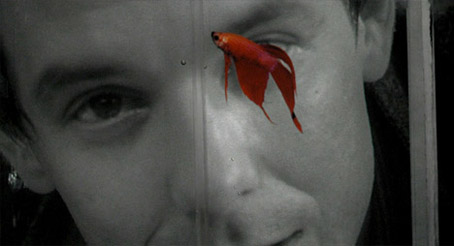
On Location In Tulsa – The Making of Rumble Fish (11' 40")
A behind the scenes look at the movie's inception yields a great deal about Coppola's own philosophy. He was (and probably still is) a very positive motivator. The chalkboard pre-viz is a wonderful glimpse at Coppola's own ambitions and the fact that he was quite a few years ahead of the game and the technology took its time catching up. The interviews both from 1983 and 2005 are revealing and all the special effects are explained. The shoot was mostly captured on low-grade video so we have some truly revealing off scene comments from an obviously disgruntled Dennis Hopper ("Francis, I didn't know you were listening, I swear to God!"). Nicholas Cage's teenage description of his character Smokey and all the elements he put together to make the whole character comes across as pretentious Luvvie bullshit of the highest order. It's really sweet in an innocent way but you can't help slapping a 2012 bit of cynicism all over it. He looks like he really believes it all too. By contrast, a young Mickey Rourke talks with real wisdom (who am I to judge?) but he makes so much sense about his own character and in such exact language. Can you tell I'm a fan? On Location In Tulsa is a solid piece of Rumble Fish extra material.
Original Theatrical Trailer (2' 20")
An anamorphically squeezed 4x3 presentation – possibly sourced on VHS – of the trailer that tried very hard to big the movie up. This is probably a consequence of marketing confusion. If it's 'new' and has no precedent, then marketing wisdom demands saying things very much like... "Universal Pictures is proud to announce... that one of today's most renowned film makers... Francis Ford Coppola... has created a unique and powerful motion picture experience." I guess they had no choice. What's fascinating is the number (at least 8) of shots that are simply not in the movie. It's actually a good example of showing what you hope people will be attracted to – sex and violence – but this trailer hints at the movie's actual nature possibly because the music is so integral to me to the experience of the movie itself. It's a solid example of its kind but as Rumble Fish is possibly unique in terms of a Hollywood movie, it doesn't surprise me that they felt it needed announcing its pedigree up front as insurance.
The Percussion-Based Score (11' 53")
"We were all working for someone who demanded innovation," says composer and ex-Police drummer, Stewart Copeland. It's a fascinating glimpse at my favourite part of the film making process – the relationship with the composer and the creation of the soul of the movie, the score. The stuff showing you the physicality of old tape and 24 track mixing desks is priceless. An appreciation of film is not reliant on knowing the history of the subject but it sure helps your sense of awe and wonder when you realize just how physically difficult and demanding all these jobs were. The invention of and the evolution of our digital tools is overwhelming and in most cases overwhelmingly positive but we have lost something along the way and I'd be the first to have a go at myself if I defined this missing thing as something spiritual. But hey, things are different now. I remember being quite struck by Copeland's work on this movie and this extra is a nice celebration of it.
Deleted Scenes (19' 24")
Again, presented as if preserved on VHS, the disc gives you two options, SD and HD but as the quality is low to start with it really makes very little difference, one being a simple up-res up of the other. The sound is rough and unmixed. And almost all the deletions are Rusty and Steve scenes. It must have broken Vincent Spano's heart to not see any of these in the final cut. The following scenes are featured:
-
Rusty and Steve discussing under the bridge whether the Motorcycle Boy is going to return.
-
Rusty is not exactly sensitive after the news that Steve's mother has had a stroke.
-
The basketball coach (John P. Ryan) wants Rusty to beat up a student.
-
Rusty steals hubcaps with Steve and both are chased, shadows playing on tarmac. They end up on a rooftop with Steve barely making the jump from one building to another.
-
Trying to get Steve drunk at Rusty's house to make him feel better about his mother's predicament.
-
Rusty trying to get Steve to commit to something. Steve calls the Motorcycle Boy nuts (this doesn't go down well). Rusty leaves with Steve still writing up quotes in his notebook.
-
The Motorcycle Boy explains the Greek myth of Cassandra to his brother, Rusty.
Accompanying Booklet – 39 pages
One of Masters Of Cinema's little gems not on the disc itself is the inlay booklet. These have never disappointed. Aside from the Film Credits, the Blu-ray Credits and Notes on Viewing, the booklet features two articles;
Both are hugely entertaining and the first is relatively rare in being one of the few pieces at the time of release that not only stood behind the movie but actually celebrated and understood what Coppola was trying to do.
Isolated music and effects track
I'm not going to say anything more about the entertainment value or lack thereof of the M&E track. Even that sounds negative. I just don't see the point of its inclusion on the disc. When was the last time STOP. I said I wasn't going to be negative so I'll just leave it there.
Rumble Fish is a very special movie that's been given very special treatment. Coppola was experimenting with expressionism and form and in 1983 I was wowed by its ambition and technique. Almost 30 years later I'm re-wowed. If your tastes run to the esoteric then I heartily recommend this genuine and sincere oddity, this honest slice of existential angst and prepare your eyes for a visual feast.
|